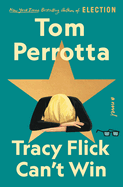
Tracy Flick, the ambitious but unlucky protagonist of Tom Perrotta's 1998 novel Election (and the 1999 movie adaptation starring Reese Witherspoon), is back and still striving in Tracy Flick Can't Win. Familiarity with Election can't hurt, but isn't necessary to follow this next installment. Perrotta (The Leftovers; Little Children) serves up his signature black comedy and shrewd wit in an expertly paced novel of great cleverness and charm. The title character is now 40-ish and working as assistant principal at Green Meadow High School, in a shabby-idyllic New Jersey suburb. Life hasn't turned out as Tracy had hoped. She left law school to care for her beloved mother, whose death 10 years ago still leaves a gaping hole. Instead of being a high-powered attorney on a rocket-like political trajectory, she serves as the hardworking second-in-command at an unremarkable public school whose football team disappoints everyone in town (except Tracy, who couldn't care less). Then Principal Jack Weede announces his pending retirement, and it might finally be Tracy's time to shine. But of course, nothing's ever easy.
Kyle Dorfman, one of the town's most successful alumni (he got rich off a virtual pet app) returns with the idea of putting together a Green Meadow High School Hall of Fame. He is also the new school board president, and therefore someone Tracy needs in her corner, but it's not clear where his loyalties really lie (aside from with Kyle). The first meeting of the Hall of Fame selection committee immediately turns sour: the obvious candidate turns out to be a former star quarterback, and Tracy's seen this routine before.
Tracy Flick Can't Win is timely. It opens with a review of the #metoo era and headlines filled with "one powerful man after another toppled from his pedestal, exposed as a sexual predator," which gives Tracy unpleasant memories of high school: "It was ancient history, a brief misguided affair--that's the wrong word, I know, but it's the one I've always used--with my sophomore English teacher, a few regrettable weeks of my teenage life." Tracy sees the world changing around her but hasn't entirely figured out her own version of it yet.
This adult Tracy Flick is vulnerable, socially awkward, frustrated and disillusioned. "My mother had been wrong: fame wasn't a reward for your hard work. It was a lottery, pure dumb luck, and it didn't matter anyway, not in the long run." She's still ambitious but worried it may be too late for her; she's been passed over for promotions, and not completing law school still smarts. Her romantic life becomes needlessly complicated when her supposed catch of a surgeon boyfriend turns clingy. Baking a cake for her daughter's 11th birthday gives her a chance to reflect on their mother-daughter relationship, which disappoints her, by contrast to her very close bond with her own late mother. The maturing Tracy has taken up a meditation practice for her blood pressure, and is working to navigate the nuances and challenges of a life less sparkly and more complicated than the one she'd intended to lead.
One of Perrotta's talents is obviously forming character. Tracy is delightfully complex; Principal Weede has secrets of his own, and a touching vulnerability as well as some less admirable qualities. Kyle is not well liked, but his attempts to compensate offer comic opportunities. The aging star quarterback nominated for the Hall of Fame, Vito Falcone, is now a recovering alcoholic working on making amends, his process by turns pitiful and hilarious. And the high school's much-loved, longtime front desk lady, Diane, is perhaps the novel's most rewarding surprise.
Chapters shift in perspective, mainly between Tracy Flick, Jack Weede and Kyle Dorfman, whose first-person voices are joined by those of the two students who serve on the selection committee. (It's déjà vu for Tracy when these are an overachieving but under-recognized girl and an affable but less impressive boy who'd beaten her out for Student Council president.) Third-person chapters feature a few other characters, like Vito Falcone and Front Desk Diane. In contrast to Tracy's justified bitterness, we get other perspectives: "The truth is, we're all prisoners of our historical context. Anybody who says morality is absolute, that right and wrong don't change over time, you know what? They just haven't lived long enough." These points of view paint Green Meadow--and Tracy--in different lights, and allow Perrotta's comedic zings to shine. Tracy Flick Can't Win is many things: of-the-moment cultural criticism, a darkly comic drama of human relationships in suburbia, a moving sendup and a novel of racing momentum. By its end, Tracy is headed either for the triumph she's been seeking since she was a high school student, or a meltdown the likes of which Green Meadow has never seen--or maybe both.
Perrotta's classic combination of insight, humor and empathy is perhaps perfected in Tracy Flick Can't Win. This novel has something for both the reader with a gimlet eye on the real world and the reader seeking an escape from it. --Julia Kastner

